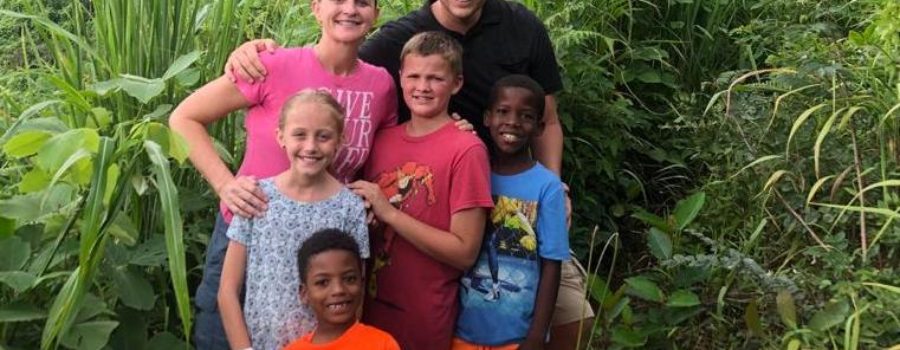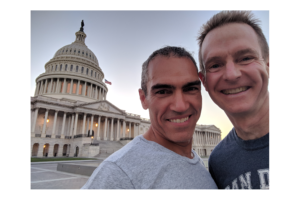The paths leading to one’s working and living in Blantyre, Malawi, are all different and interesting. A joy of living outside the USA is hearing the stories of one’s friends and co-workers, their path here and why they return. Over lunch, I talked to Nicole O’Brien. Her story is inspiring, even by global health worker standards.
Nicole is a pediatric intensive care unit physician who has worked in Africa since 1994. I know her because, three years ago, she moved her primary work site to Malawi. Like me, she splits her time between the USA and Africa. Unlike me, wherever she is working, she brings her family along. Today I spoke to Nicole about them.
She and her husband, Will, have four children, two biological and two adopted. Each of the kids is fantastic in their own way; together they make a happy, beautiful family. Their journey-to-being-six began in 2013 when a US-based agency identified two children available for adoption in Lodja, Democratic Republic of Congo (DRC). Despite the many challenges of pursuing adoption in this remote corner of the world, Will and Nicole decided this was a “go.” They began the long, complex, paperwork-heavy process to adopt the children. Simultaneously, Nicole applied for a Fulbright fellowship. If it was awarded, her project would be based in Lodja, allowing the entire family to live together, moving back and forth between Africa and the USA.
A year later, in late 2014, Will relocated to Lodja to live with their soon-to-be-adopted children. Six months later, the arrangements were almost completed. One remaining form needed to be signed and stamped before everyone could fly to Columbus, Ohio, their base in the USA. The more Will came to know his newest family members, though, the murkier the children’s story became. Something was not being divulged by the orphanage. Inquiries were met with long complicated explanations by the Director, but no information could be obtained from the children themselves. Finally in January 2015, the truth came out. The children’s parents were alive and living locally. The Director, who collected a fee from each adoption, had promised the parents that if they allowed the children to be adopted, their entire family would eventually immigrate to the United States.
This was child trafficking.
Will probed further, discovering that all the orphanage’s children were being trafficked. One child’s father was away studying in Kinshasa. When the mother died, the Director arranged a rapid adoption, telling the father that the mother and child had died together. After another child’s father had passed away, the toddler was kidnapped from the mother and placed in the orphanage, up for adoption. Most commonly, though, families who could no longer afford their children were promised payment from the Director in exchange for placing them up for adoption. Sometimes those payments materialized, sometimes not.
Nicole and Will notified the police, telling them the children’s stories and spreading the news to the community itself. Before the Director could be arrested, he disappeared. He has never faced justice. The parents of the children in the orphanage were located. Though families were reunited, the economic and social conditions that led to this situation were unchanged. Poverty and lack of education and economic opportunities persisted. It was a matter of time before an analogous situation appeared, again placing the most vulnerable in the community, its children, in danger. Despite understanding this, Nicole and Will, of course, were deeply disappointed. They departed after spending a great deal of time, money, and emotional investment in Lodja. They decided that adoption was no longer in their future.
At the same time, the Fulbright Fellowship review committee was meeting. The reviewers read all of the applications, ranked them in order, and decided whose projects would be funded. Nicole’s project, in Lodja, was a winning one. She and Will had to make a decision: would they return to Lodja or would she decline the Fulbright?
They went back. They decided, rather than ignoring the situation, to try to intervene to change the town’s economic environment, one that led to children being sold to others. Stopping child trafficking worldwide was an overarching goal but an unachievable one. But perhaps they could do something on a smaller scale.
They went to work, establishing a private foundation, naming it Restore Elikia, “hope” in Lingala, the local language. The Foundation’s purpose is to implement programs to raise up the entire community, finding local solutions to local problems. Many in the community had no place to raise food and were starving. The Foundation bought large tracts of land, divided it into plots, and gave plots to community members. In exchange, farmers keep 90% of what they produce, giving the remaining 10% to the newly established, ethical orphanage run by the Foundation. After the Foundation discovered that the local school had 150 children per classroom, they began construction on a new, larger building and will employ more teachers. When the local community identified a lack of protein as an impediment to health, Nicole and Will asked their local partners to suggest solutions. Their answer? Fish ponds. An initial investment of $1000 resulted in 75 ponds, each dug by hand. Weekly, the ponds yield 400 pounds of fish providing an important protein source to the entire community. Local families help with harvesting the fish. The ponds are drained, bucket by bucket. Local people gather the fish by hand, taking some home, selling the remainder at the local market, and using the resulting funds for women’s empowerment education and programming.
Nicole and Will’s payment for organizing, fundraising, and overseeing these activities is not monetary. It is the satisfaction of knowing that they are helping others, creating a social safety net in a place where none exists, and improving the economics of the community to a level where poor families need not give up their children for adoption in exchange for payments or the hope of a better life elsewhere.
Despite their disappointments in being unable to adopt the children in Lodja, Nicole and Will’s adoption story did not end. In September 2016, shortly after beginning the Fulbright, they were contacted by a second adoption agency. Two brothers, living in Haiti and ages 3 and 6 years old were living in an orphanage and waiting for a new home. Were they interested? After vetting the conditions leading to the boy’s availability for adoption, they flew to Haiti and met their new sons for the first time.
I knew the outlines of Nicole’s story, but not the details. I laughed. How can this principled, moral person, her husband, and her four children tolerate being around me? Can someone be so virtuous and yet so kind? Apparently so. I am privileged to know Nicole and her family and have them be part of my life. I know someone who gathers good karma every day they are on Earth. And now you do, too. Today, please do a good deed and tell someone about a Great Good in our world. Make them smile.
Visit Restore Elikia.org





